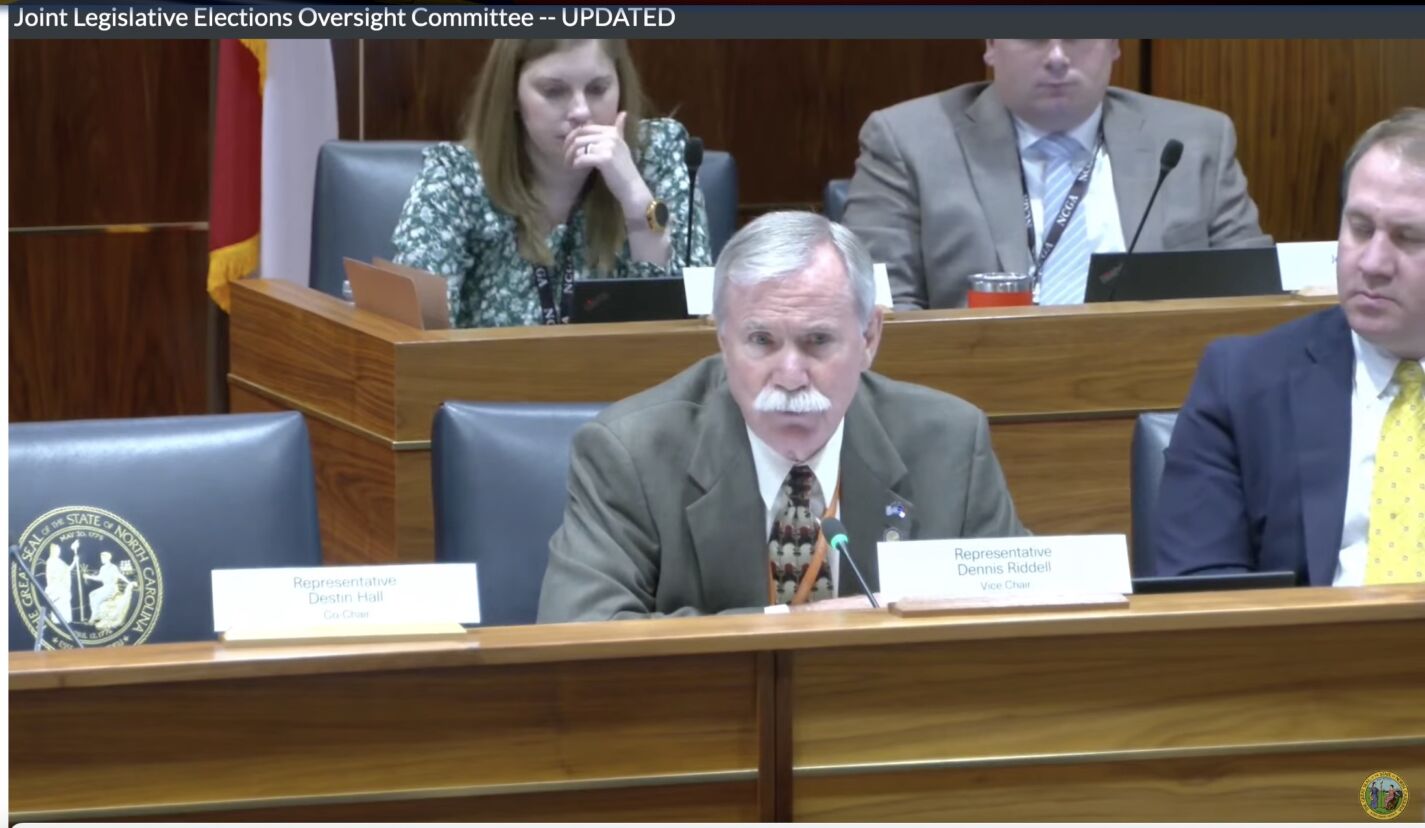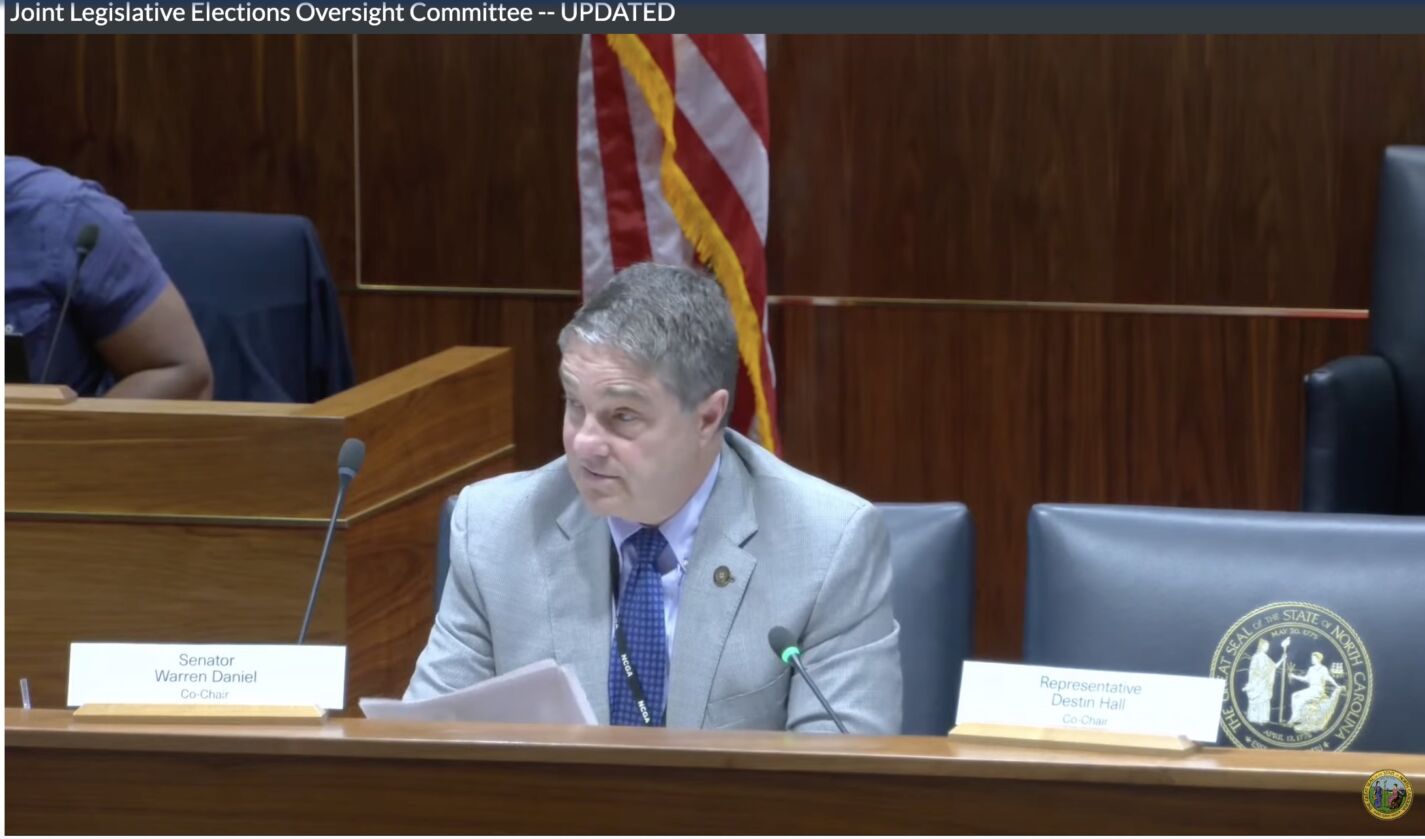Karen Brinson Bell, executive director for the North Carolina State Elections Board (NCSBE), and Paul Cox, general counsel for NCSBE, presented a report to the Joint Legislative Elections Oversight Committee on Wednesday. The report provided a wrap-up of the March primary and addressed other issues, but it also raised questions about a contradictory measure taken by the board recently regarding early voting site changes.
Brinson Bell reiterated a report given at a March 26 NCSBE board meeting on the certification of the March 5 primary, including turnout figures, registration changes, changes to the absentee voting deadline, provisional ballots related to ID that were not counted, and early voting numbers.
She also talked about the successful large-scale use of Voter ID, the need for more county election board workers — especially election director vacancies —and the need to restore the number of field support specialists, which currently stands at six, back to eight.
“I would ask that there be a recognition of urgency as we head into this presidential election,” Brinson Bell told lawmakers.
Also noted was the need to modernize the state election information management system, which dates back to 1998. Brinson Bell, who likened the system to an Atari gaming system from the 1980s, said they have received about $5 million of the $8 million in funding they requested to complete the modernization.
Rep. Pricey Harrison, D-Guilford, asked about what is being done about protection from AI, given the rise in deep fakes at both state and national levels.
Brinson Bell responded that the board is brainstorming about where they need to be with the possibility that AI may have trickle-down effects on campaign finance regulations and disclosures and things of that nature. She mentioned that other state legislatures are looking at ways to combat AI in elections.
She also mentioned that she would like to discuss with the legislature about possibly joining the Electronic Registration Information Center (ERIC).
ERIC was created in 2012 as a nonprofit, nonpartisan membership organization created to help election officials maintain their voter rolls. However, a study from Judicial Watch indicated that there were problems within ERIC, including allegations of a Democrat bias and data sharing with left-leaning organizations.
The General Assembly repealed NCSBE’s authorization to join ERIC with the budget in 2023.

Rep. Dennis Riddell, R-Alamance, told Brinson Bell he didn’t share her enthusiasm for ERIC.
“I think they’re expensive, and I think a way of working around that is to get direct access through existing state information database,” he said. “I think ERIC was mostly a private information mining excursion more than it was actual electioneering help.”
Sen. Warren Daniel, R-Burke, one of the co-chairs of the Oversight Committee, asked Brinson Bell about her goal of eliminating voters with incomplete registration data.

She said it was cyclical and naturally happens, especially in a presidential year when they see increases in voter registration. So, she doesn’t believe they have to set a goal for it.
Daniel, not impressed with the answer, said they really aren’t making any progress in reducing the number of incomplete entries. Brinson Bell disagreed.
“If we showed you charts and graphs, you’ll see that it ebbs and flows,” she said. “So, the progress is being made because when we do our processes, those 7-8 different checks, the list maintenance, which we can provide you with about a 40-page manual on our list processes that we’re doing like we were talking about the death record checks and things, these do get updated. So, there is progress being made.”
She also told Daniel that the pilot program for signature verification for absentee ballots was delayed because they haven’t secured a vendor and won’t be ready by the May 1 deadline the legislature initiated.
Daniel had one final question for Brinson Bell regarding the change in the deadline for county boards of elections to identify early voting locations.
Brinson Bell notified counties at the beginning of April that early voting plans are now due by May 7, a departure from the customary August deadline. The board offered no explanation for the sudden shift of scheduling deadlines.
“Why is the board doing this over the objections of so many local boards, and what’s the necessity when before they had to submit it to you around 90 days before the election,” Daniel asked. “Why is it now necessary to do it 180 days before the election?”
She replied that NCSBE chairman Alan Hirsch had decided to change the date.
“He does get to set the agenda,” Brinson Bell stated. “He does get to call the meetings. The rationale from the chair has been that there is the potential for uncertainty for there to be changes in our election processes, and right now, one of the things that we do know is that we need early voting plans as we head into the November elections.”
She added that they have had very limited negative responses from counties about the date change.
Brinson Bell also said that Hirsch factored in that the counties are generally consistent about the number and location of sites, but it had also been determined that for more than one cycle, they are finding that counties are not able to give sufficient notice to some of the facilities and are having to have recreational departments choose between ‘voting or pickleball.’
“We need to provide them the opportunity to get those sites secured sooner rather than later,” she said.
Those statements, many say, are concerning and contradictory to moving up the deadline.
“In one statement, she says this was the choice of NCSBE chair Alan Hirsch due to the ‘potential for uncertainty, for there to be changes in our election process’ and in another, that this action was to give more time to local governments to find site locations, taking an emphasis on sites such as community centers and gyms,” Jim Stirling, research fellow at the John Locke Foundation’s Civitas Center for Public Integrity told Carolina Journal. “Both these answers are concerning.”
Stirling said Brinson Bell’s first statement regarding changes to elections is likely a reference to the lawsuit against SB 749, a bill the General Assembly passed last year changing the composition of Boards of Elections to be evenly divided between both major political parties. This could be interpreted as the board wishing to lock in early voting locations while Democrats still maintain a majority advantage on both the state and county boards of elections.
He also said her statement that moving up the deadline to benefit local governments, to him, makes no sense.
“Suddenly moving up the deadline for early voting site locations by three months limits the amount of time local boards of elections can reach out to potential early voting locations,” Stirling said. “Locations that receive taxpayer funding, like community centers and school gyms, would need to be approached by county boards by no later than April 16th. The board’s notice went out on April 1st, giving these counties only two business weeks to reach out to these locations. All while preparing for the runoff election.”
Brinson Bell told Daniel the change was administrative.
“It’s a very administrative thing, and there may be precedents, but it doesn’t mean that we can’t change things,” she said. “We have other methods that are in processes that we change the date to accommodate the changes in the election cycle.”